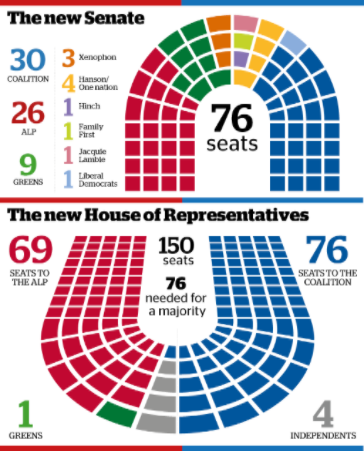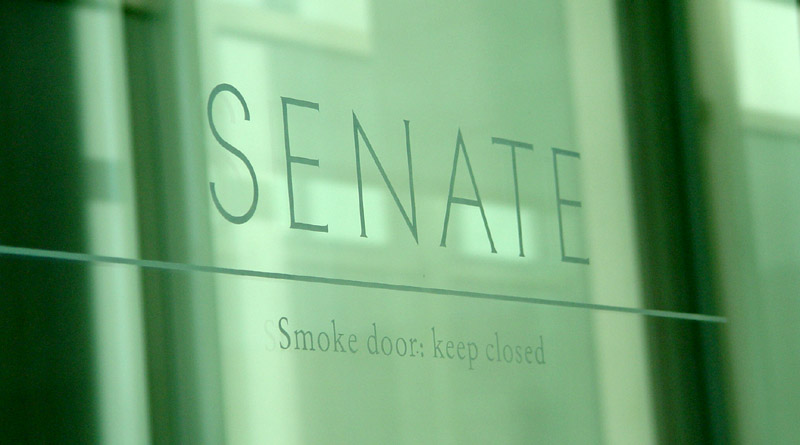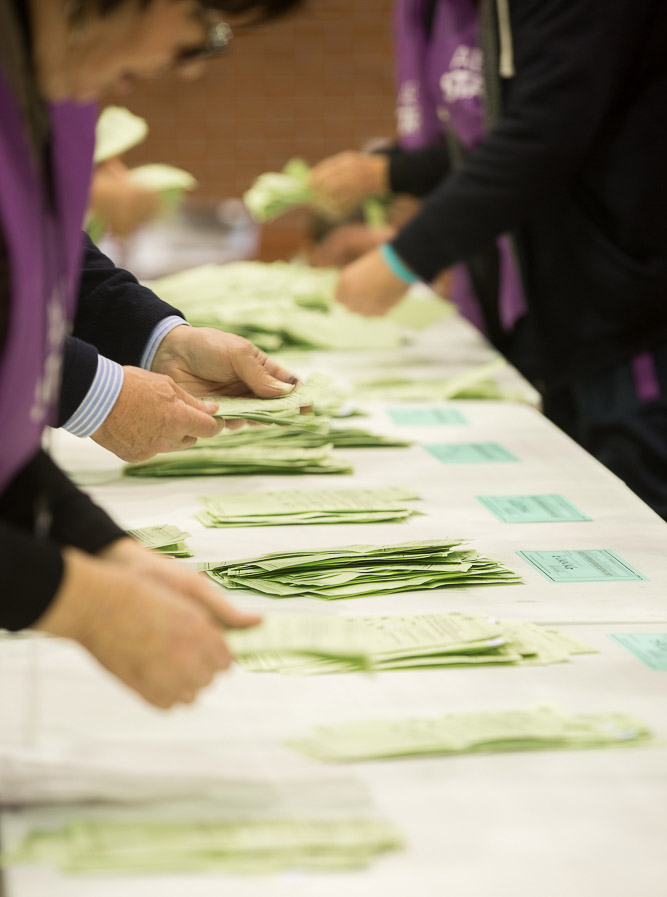More than one month after Australia went to the polls, the final composition of the Senate has been confirmed.
The count for the Senate almost always takes longer than for the House of Representatives, chiefly due to the added complexity of distributing preference flows. The fact the most recent election was a double dissolution had the effect of delaying results further still, with twice as many seats up for re-election compared to an ordinary election.
There are 76 seats in the Senate, including 12 from each state and two from each territory, meaning a party must win 39 seats to have a majority.
The Coalition won 33 Upper House seats at the 2013 election, while Labor won 25, the Greens won 10 and Independents won eight.
This time around, the Coalition won 30 seats, Labor won 26, the Greens won nine and Independents won 11. When assessed on this measure alone, it appears the Government’s decision to call a double dissolution election was ill-conceived, with it now requiring nine crossbench votes to pass legislation.

The crossbench of the 45th Parliament looks quite different compared to the last term of Parliament. Prior to the election, some commentators predicted Nick Xenophon would hold the balance of power this term. To an extent, these commentators were correct, with the Nick Xenophon Team picking up three Senate seats that the Government will be eager to gain the support of.
However, what few people predicted was the extent of One Nation’s success, with the party winning four seats in total, making it the fourth largest force in the Upper House. Other successful Independent crossbenchers include second term Senators Bob Day AO, David Leyonhjelm and Jacqui Lambie and first term Senator Derryn Hinch.
2016 federal election Senate results are as follows:
New South Wales
New South Wales’ contribution to the Upper House appears similar to that following the 2013 election, with the exception of the Liberal Party losing one seat to One Nation. Although some commentators argued Senator Leyonhjelm was only elected in 2013 as a result of voters mistaking him for a Liberal Party candidate, the Senator has been re-elected for a second term.
- Marise Payne (LIB)
- Arthur Sinodinos AO (LIB)
- Concetta Fierravanti-Wells (LIB)
- Fiona Nash (NAT)
- John Williams (NAT)
- Sam Dastyari (ALP)
- Jenny McAllister (ALP)
- Deborah O’Neill (ALP)
- Doug Cameron (ALP)
- Lee Rhiannon (GRN)
- Brian Burston (PHON)
- David Leyonhjelm (LDP)
Queensland
Perhaps the most sensational Senate story of the 2016 election is the rise of Pauline Hanson’s One Nation party, which picked up two seats in Queensland, depriving former Palmer United Party-turned-Independent Senator Glenn Lazarus of a second term. The Liberal Party maintained its status as the most successful party in the state, winning five seats, followed by Labor on four. The Greens also won one seat.
- George Brandis (LIB)
- Matthew Canavan (LIB)
- James McGrath (LIB)
- Ian Macdonald (LIB)
- Barry O’Sullivan (LIB)
- Murray Watt (ALP)
- Anthony Chisholm (ALP)
- Claire Moore (ALP)
- Chris Ketter (ALP)
- Larissa Waters (GRN)
- Pauline Hanson (PHON)
- Malcolm Roberts (PHON)
South Australia
As expected, South Australia proved to be a unique case in the race for Upper House seats, primarily due to the influence of one man: Nick Xenophon. Indeed, the Nick Xenophon Team picked up three seats in total, the same number as Labor. Meanwhile, the Liberal Party won four seats and the Greens and Family First each won one. It is likely the Government will be particularly mindful of engaging with the Nick Xenophon Team’s crossbenchers in order to pass legislation through the Upper House.
- Simon Birmingham (LIB)
- Cory Bernardi (LIB)
- Anne Ruston (LIB)
- David Fawcett (LIB)
- Penny Wong (ALP)
- Don Farrell (ALP)
- Alex Gallacher (ALP)
- Nick Xenophon (NXT)
- Stirling Griff (NXT)
- Skye Kakoschke-Moore (NXT)
- Sarah Hanson-Young (GRN)
- Bob Day (FFP)
Victoria
The Coalition picked up one extra seat compared to 2013, with the election of first term Senate candidate Jane Hume bringing its total to five. While Labor and the Greens retained their existing four and two seats respectively, Independent Senators John Madigan and Ricky Muir lost their positions in the Upper House. Broadcaster Derryn Hinch was successfully elected on the back of his campaign to introduce harsher penalties for sex offenders.
- Mitch Fifield (LIB)
- Scott Ryan (LIB)
- James Paterson (LIB)
- Jane Hume (LIB)
- Bridget McKenzie (NAT)
- Kim Carr (ALP)
- Stephen Conroy (ALP)
- Jacinta Collins (ALP)
- Gavin Marshall (ALP)
- Richard Di Natale (GRN)
- Janet Rice (GRN)
- Derryn Hinch (DHJP)
Tasmania
Tasmania was the first state to have its Senate vote finalised, with no change in terms of party representation compared to the 2013 election, despite veteran Liberal Senator Richard Colbeck losing his seat. 58 candidates listed on the ballot paper this year from 27 different parties. Labor won the most seats, with five in total, while the Liberals won four, the Greens won two and the Jacqui Lambie Network won one.
- Eric Abetz (LIB)
- David Bushby (LIB)
- Jonathon Duniam (LIB)
- Stephen Parry (LIB)
- Catryna Bilyk (ALP)
- Carol Brown (ALP)
- Helen Polley (ALP)
- Lisa Singh (ALP)
- Anne Urquhart (ALP)
- Nick McKim (GRN)
- Peter Whish-Wilson (GRN)
- Jacqui Lambie (JLN)
Western Australia
Western Australia’s representation in the Senate is largely the same as it was before the election, with 10 of the state’s 12 Senators being re-elected. New additions to the fold include One Nation’s Rod Culleton and Labor’s Louise Pratt, who makes a return after losing her seat in 2014. Whether Mr Culleton will be allowed to remain in his new position is unclear, as he currently faces trial for larceny. If it is decided Mr Culleton is ineligible, another One Nation candidate will take his place.
- Mathias Cormann (LIB)
- Michaelia Cash (LIB)
- Dean Smith (LIB)
- Linda Reynolds (LIB)
- Chris Back (LIB)
- Sue Lines (ALP)
- Glenn Sterle (ALP)
- Patrick Dodson (ALP)
- Louise Pratt (ALP)
- Scott Ludlam (GRN)
- Rachel Siewert (GRN)
- Rodney Culleton (PHON)
Australian Capital Territory
As expected, Liberal Party Senator Zed Seselja was returned for a second term and has since been promoted to the Turnbull Ministry. Former Labor ACT Chief Minister Senator Katy Gallagher was re-elected too.
- Zed Seselja (LIB)
- Katy Gallagher (ALP)
Northern Territory
Veteran Senator and respected Indigenous Affairs Minister Nigel Scullion retained his seat, whilst Labor Party candidate Malarndirri McCarthy has now made her Senate debut.
- Nigel Scullion (CLP)
- Malarndirri McCarthy (ALP)
The new Senate will be sworn in at the end of this month.
Note: LIB = Liberal Party; CLP = Country Liberal Party; ALP = Labor Party; GRN = Greens; PHON = Pauline Hanson’s One Nation; NXT = Nick Xenophon Team; DHJP = Derryn Hinch’s Justice Party; JLN = Jacqui Lambie Network; LDP = Liberal Democratic Party.



